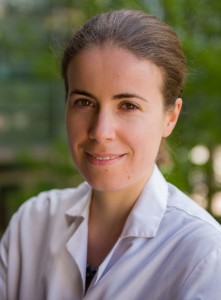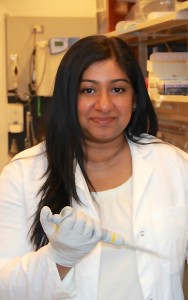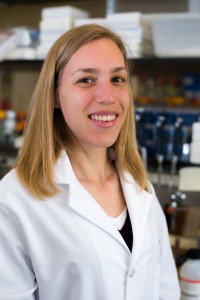2013 Grantees
 Elizaveta Freinkman, Ph.D., The Whitehead Institute at MIT, in the laboratory of David Sabatini, M.D., Ph.D. With a five-year survival rate below 5%, pancreatic ductal adenocarcinoma (PDAC) is a disease in dire need of new therapeutic strategies. Recent research has revealed that cancer cells harbor numerous metabolic alterations that support their growth, proliferations, and resistance to drugs and cellular stress; importantly, these metabolic changes can be targeted by new cancer treatments. To apply this insight to pancreatic cancer, I will explore the observation that many of the diverse metabolic enzymes expressed in the normal pancreas are absent in PDAC cells. I will determine which of these metabolic changes specifically promote the process of malignant transformation, as well as how this occurs. I will also identify ways in which, as a result of losing these enzymes, PDAC cells may become vulnerable to interventions such as deprivation of nutrients or inhibition of metabolic pathways that are dispensable in normal cells. Finally, I will investigate the connection between cellular metabolism and the aberrant genomic modifications that are a hallmark of PDAC, in order to identify metabolic interventions that can halt the malignant gene expression program. This will be the first study to systematically analyze the unique features and therapeutic opportunities in the cellular metabolism of this devastating cancer.
Elizaveta Freinkman, Ph.D., The Whitehead Institute at MIT, in the laboratory of David Sabatini, M.D., Ph.D. With a five-year survival rate below 5%, pancreatic ductal adenocarcinoma (PDAC) is a disease in dire need of new therapeutic strategies. Recent research has revealed that cancer cells harbor numerous metabolic alterations that support their growth, proliferations, and resistance to drugs and cellular stress; importantly, these metabolic changes can be targeted by new cancer treatments. To apply this insight to pancreatic cancer, I will explore the observation that many of the diverse metabolic enzymes expressed in the normal pancreas are absent in PDAC cells. I will determine which of these metabolic changes specifically promote the process of malignant transformation, as well as how this occurs. I will also identify ways in which, as a result of losing these enzymes, PDAC cells may become vulnerable to interventions such as deprivation of nutrients or inhibition of metabolic pathways that are dispensable in normal cells. Finally, I will investigate the connection between cellular metabolism and the aberrant genomic modifications that are a hallmark of PDAC, in order to identify metabolic interventions that can halt the malignant gene expression program. This will be the first study to systematically analyze the unique features and therapeutic opportunities in the cellular metabolism of this devastating cancer.
 Leni Jacob, Ph.D., Memorial Sloan-Kettering Cancer Center, in the laboratory of Joan Massague, Ph.D. This project aims to study the most difficult-to-treat subset of cancer cells from most cancer types, cancer cells that have spread, or metastasized, to other organs. Metastatic disease is the greatest impediment to the therapeutic care of cancer patients and accounts for more than 90% of cancer-related deaths. Even following the successful treatment of localized primary cancers, including those of the breast, lung, prostate, kidney, and thyroid, the risk for developing metastatic lesions remains substantial. Cancer cells that leave the primary tumor, or disseminated tumor cells (DTCs), can often lay dormant at distant organ sites for months or years, resistant to current therapies, before developing into overt metastatic tumors. Disseminated tumor cells likely employ potent molecular programs to persist at distant organ sites despite the stresses incurred from cancer therapies and adapting to an unfamiliar cellular environment. Very little is known about DTC biology because few tools and experimental models exist to study them. Through this project we are generating experimental model systems of latent cancer and will use these tools to reveal and dissect the genes and molecular pathways that promote DTC survival. Uncovering the molecular mechanisms on which DTCs rely will provide targets for the design of novel cancer therapeutics that have the potential to cut rates of cancer relapse.
Leni Jacob, Ph.D., Memorial Sloan-Kettering Cancer Center, in the laboratory of Joan Massague, Ph.D. This project aims to study the most difficult-to-treat subset of cancer cells from most cancer types, cancer cells that have spread, or metastasized, to other organs. Metastatic disease is the greatest impediment to the therapeutic care of cancer patients and accounts for more than 90% of cancer-related deaths. Even following the successful treatment of localized primary cancers, including those of the breast, lung, prostate, kidney, and thyroid, the risk for developing metastatic lesions remains substantial. Cancer cells that leave the primary tumor, or disseminated tumor cells (DTCs), can often lay dormant at distant organ sites for months or years, resistant to current therapies, before developing into overt metastatic tumors. Disseminated tumor cells likely employ potent molecular programs to persist at distant organ sites despite the stresses incurred from cancer therapies and adapting to an unfamiliar cellular environment. Very little is known about DTC biology because few tools and experimental models exist to study them. Through this project we are generating experimental model systems of latent cancer and will use these tools to reveal and dissect the genes and molecular pathways that promote DTC survival. Uncovering the molecular mechanisms on which DTCs rely will provide targets for the design of novel cancer therapeutics that have the potential to cut rates of cancer relapse.
Dr. Jacob is the Hope Funds for Cancer Research Green-Burgess Fellow
 Bluma Lesch, M.D., Ph.D., The Whitehead Institite at MIT, in the laboratory of David Page, M.D. My project focuses on myeloid and lymphoid leukemias, and on medulloblastoma, a pediatric brain tumor. Although hematologic malignancies and medulloblastomas represent very different types of cancer, both have been associated with mutations in the histone demethylase gene Utx. I will use loss-of-function mutations in Utx to induce an altered epigenetic state in the germline, and determine the risk of developing leukemia or medulloblastoma in offspring inheriting this altered epigenetic state. Cancer frequently runs in families. This observation has driven the discovery of many genes crucial to the initiation and progression of malignancy in both familial and spontaneous tumors. Importantly, identification of inherited mutations in cancer-prone families has also had a profound impact on the lives of the people carrying them. Once aware that he or she is carrying a cancer-associated mutation, a person can take highly effective preventive measures to avoid developing the disease. Despite these important genetic discoveries, however, most of the risk associated with heritable cancers remains unexplained: currently, known gene mutations account for only a minority of familial cancer cases. As a Hope Funds Fellow, I will test the hypothesis that some of this inherited risk can be explained by epigenetic changes passed from generation to generation through the sperm or egg. Like genetic mutations, epigenetic changes alert the molecular state of the cell and can drastically alter a cell’s behavior, but unlike genetic mutations, they do not directly alter gene sequence. The possibility that inherited epigenetic defects contribute to familial cancer risk has not been seriously examined up to this point. If true, it will open the way to better understanding of general cancer mechanisms, and may also allow individuals with a family history of cancer to preempt development of the disease in themselves and their families.
Bluma Lesch, M.D., Ph.D., The Whitehead Institite at MIT, in the laboratory of David Page, M.D. My project focuses on myeloid and lymphoid leukemias, and on medulloblastoma, a pediatric brain tumor. Although hematologic malignancies and medulloblastomas represent very different types of cancer, both have been associated with mutations in the histone demethylase gene Utx. I will use loss-of-function mutations in Utx to induce an altered epigenetic state in the germline, and determine the risk of developing leukemia or medulloblastoma in offspring inheriting this altered epigenetic state. Cancer frequently runs in families. This observation has driven the discovery of many genes crucial to the initiation and progression of malignancy in both familial and spontaneous tumors. Importantly, identification of inherited mutations in cancer-prone families has also had a profound impact on the lives of the people carrying them. Once aware that he or she is carrying a cancer-associated mutation, a person can take highly effective preventive measures to avoid developing the disease. Despite these important genetic discoveries, however, most of the risk associated with heritable cancers remains unexplained: currently, known gene mutations account for only a minority of familial cancer cases. As a Hope Funds Fellow, I will test the hypothesis that some of this inherited risk can be explained by epigenetic changes passed from generation to generation through the sperm or egg. Like genetic mutations, epigenetic changes alert the molecular state of the cell and can drastically alter a cell’s behavior, but unlike genetic mutations, they do not directly alter gene sequence. The possibility that inherited epigenetic defects contribute to familial cancer risk has not been seriously examined up to this point. If true, it will open the way to better understanding of general cancer mechanisms, and may also allow individuals with a family history of cancer to preempt development of the disease in themselves and their families.
October 1, 2013 publication in PNAS: PNAS-2013-Lesch-16061-6
May 8, 2014 publication in Cell: lesch_cell_May 2014
